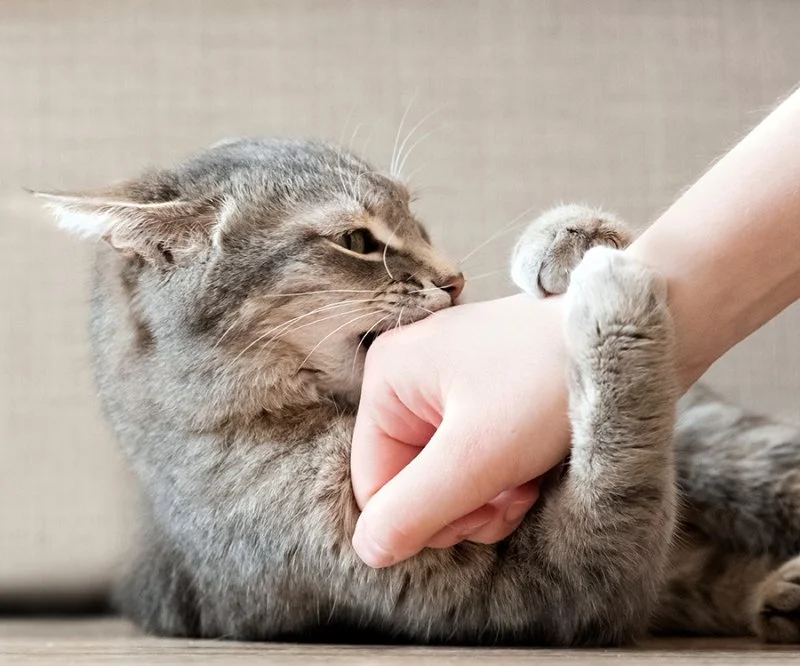
Why Does My Kitten Bite My Fingers? Play Aggression Explained
If you’ve recently welcomed a kitten into your home, you may have noticed that their playful nature often involves nibbling on your fingers. While it may seem cute at first, it’s common for new kitten owners to wonder why their kittens bite and how to stop the behavior. Understanding play aggression in kittens is key to addressing this behavior and teaching them appropriate ways to engage with you. In this article, we’ll explore why kittens bite, how to manage the biting, and offer tips for nurturing healthy play habits.
1. Understanding Play Aggression in Kittens
Before diving into how to stop kitten biting, it’s important to understand why it happens in the first place. Play aggression is a common behavior in young kittens and is usually a part of their development. Kittens naturally engage in play behavior as they learn to hunt, interact, and explore the world around them. Biting is often an instinctive response to play, and it can mimic the behaviors they would use in the wild to catch prey.
1.1 Kitten Development and Play
When kittens are young, their teeth and claws are still developing, and they often use their mouths to explore their environment. This includes gentle biting during play with their littermates or their owners. It’s a way for them to practice their hunting skills, even if there’s no real prey to capture. Play aggression is typically harmless but can become a nuisance if not addressed early on.
1.2 The Importance of Early Socialization
Socialization plays a significant role in a kitten’s behavior. Kittens that are not properly socialized during their early weeks may exhibit more pronounced play aggression. They may not learn the proper boundaries for play and could end up being more aggressive with their human family members. Ensuring that your kitten has opportunities to interact with other cats and people can help prevent excessive biting and scratching later in life.
2. How to Respond to Kitten Biting
If your kitten is biting your fingers during play, it’s important to know how to respond in a way that teaches them appropriate behavior. Here are a few methods you can use to reduce the likelihood of your kitten biting:
2.1 Use Toys Instead of Your Hands
One of the most effective ways to prevent kitten biting is to redirect their attention to a toy. When your kitten starts to nibble on your fingers, offer them a toy instead. Toys that mimic prey, such as feather wands, are especially effective in engaging their natural hunting instincts. This not only gives them an outlet for their energy but also helps protect your hands from bites.
2.2 Avoid Rough Play
Rough play with your kitten can encourage aggressive behavior, including biting. If you engage in games where your hands or feet are the target, your kitten may start associating hands with playtime and bite more often. Instead, use toys that can be safely bitten and chewed, and try to keep your hands and fingers out of the “game.” This will teach your kitten that biting human skin is not acceptable.
2.3 Use Positive Reinforcement
Positive reinforcement can be a powerful tool for modifying your kitten’s behavior. Whenever your kitten plays gently without biting, reward them with praise or a treat. Over time, your kitten will learn that gentle play is rewarded and biting is not. Patience and consistency are key when using positive reinforcement.
3. Common Reasons for Kitten Biting
There are several reasons why your kitten may be biting you, and understanding the root cause can help you address the behavior more effectively. Here are some common reasons kittens bite:
3.1 Teething
Teething is a natural part of a kitten’s development. As their adult teeth come in, kittens may experience discomfort and chew on objects to soothe their gums. This can lead to more biting, especially during playtime. Providing chew toys or teething rings designed for kittens can help alleviate the discomfort and reduce biting behavior.
3.2 Boredom and Lack of Exercise
Kittens are full of energy, and if they don’t have enough outlets to burn it off, they may resort to biting as a way to entertain themselves. Ensuring that your kitten has plenty of playtime, toys, and enrichment can help reduce their tendency to bite out of boredom. Regular exercise through play helps keep them physically and mentally stimulated, which reduces unwanted behaviors like biting.
3.3 Lack of Socialization
Kittens that were not properly socialized during their early weeks may have difficulty understanding the boundaries of play. They may be more prone to biting, as they have not learned how to interact appropriately with humans and other animals. Socializing your kitten from an early age and exposing them to different people and environments can help mitigate this behavior.
4. When to Consult a Veterinarian
In most cases, biting during play is normal kitten behavior that can be managed with proper training and redirection. However, if the biting becomes excessive, painful, or is accompanied by other behavioral issues, it may be worth consulting a veterinarian. A veterinarian can rule out underlying medical issues, such as dental problems or pain, that may be contributing to your kitten’s biting behavior.
5. How Omnia Pet Can Help
If you’re struggling with your kitten’s biting behavior, Omnia Pet can help! We offer a range of products and resources to support you in raising a well-behaved kitten. From interactive toys that redirect biting behavior to training tips and guides, we have everything you need to help your kitten learn good habits. Visit us today to find the perfect products to help with your kitten’s play aggression!




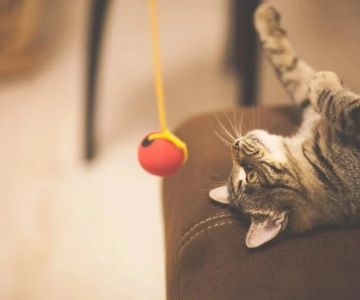
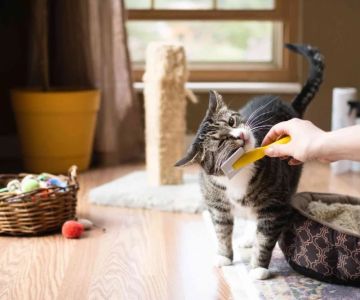

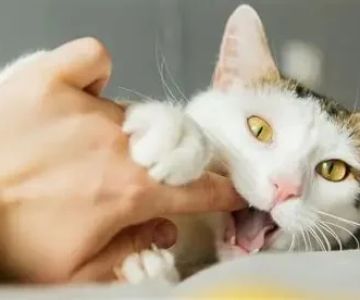
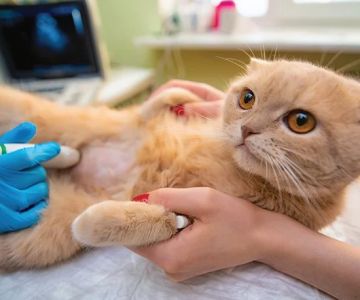
 Hollywood Feed4.0 (184 reviews)
Hollywood Feed4.0 (184 reviews) Brew Biscuits5.0 (2 reviews)
Brew Biscuits5.0 (2 reviews) All Friends Animal Hospital4.0 (446 reviews)
All Friends Animal Hospital4.0 (446 reviews) Kittylandkittens LLC0.0 (0 reviews)
Kittylandkittens LLC0.0 (0 reviews) Village Animal Clinic4.0 (212 reviews)
Village Animal Clinic4.0 (212 reviews) Rift Lake Aquatics4.0 (165 reviews)
Rift Lake Aquatics4.0 (165 reviews) Understanding Pet Insurance: What Does It Actually Cover?
Understanding Pet Insurance: What Does It Actually Cover? How to Keep Your Kitten's Eyes Clean and Free of Discharge
How to Keep Your Kitten's Eyes Clean and Free of Discharge The Truth About Heartworm Disease: Prevention is Cheaper Than Cure
The Truth About Heartworm Disease: Prevention is Cheaper Than Cure Why Is My Kitten's Belly Button Showing? | Omnia Pet
Why Is My Kitten's Belly Button Showing? | Omnia Pet Why Does My Cat Bite Me Gently? Love Bites Explained
Why Does My Cat Bite Me Gently? Love Bites Explained How to Stop Your Kitten from Getting into Cabinets
How to Stop Your Kitten from Getting into Cabinets